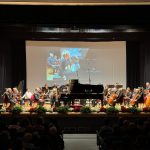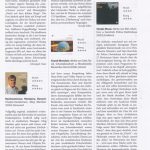INTERNATIONAL PIANO November December 2007
Tchaikovsky Piano Concertos — nos.1 in in B flat minor op.23, 2 in G major op.44 (original version) & 3 in E flat major op.75, Andante and Finale op.79 (orch.Taneyev). Concert Fantasia in G major op.56. Allegro in C minor op.posth. Oleg Marshev pf Aalborg Symphony Orchestra / Owain Arwel Hughes Danacord DACOCD 586-587
Recorded in 2001-2, this Tchaikovsky cycle has been a long time coming. Finely produced and engineered, enjoying committed support from the Aalborg band and strong direction under Hughes, here are performances of style and authority, knocking just about every other into a cocked hat. What’s more there’s no set currently more complete: the early C minor Allegro for piano and strings might not be anything to write home about but it’s still useful to have on the shelf. Both the Zhukov (1971) and Hoteev (1997) versions are deleted.
Marshev isn’t after shock effects or histrionics, and speed records aren’t his thing. For sure there are starrier, more fashionably in-demand B fiat minors around, but few of such honesty, emotional commitment or responsive interplay, Equal to every technical challenge, he gives us the notes without frills, the adrenalin rising progressively across 36 minutes to climax in the double-octaves and big tune at the end. Salvaged from an aborted Symphony in E flat (1892-3), the single-movement Third Concerto plus Taneyev’s (unfairly maligned) Andante and finale completion are more splendid than I’ve heard in a long while. The poetry and orchestral solos of the Andante are winged with genuine nostalgia. With Barry Douglas’s bronzed account of the Second Concerto no longer available, Marshev more or less has the field to himself. True, there are things in other performances I wouldn’t want to be without (Gilels’s iron glory, Siloti cuts notwithstanding; Donohoe’s slow movement with Kennedy and Isserlis — what a coup that was). But Marshev has enough mood, personality and Slavonic intensity to stamp his own signature on the work, leaving the blander likes of Pletnev, Scherbakov or Glemser lower down the ladder. As in the Third, he demonstrates a tight structural grasp, favouring integration before indulgence. The contrasts of the first movement are keenly judged, the declamation and rhetoric of the principal cadenza expanding into a crowning arch of super-pianism. And the rhythmic èlan and cavalry carter of the folk-finale is not to be missed, in the (these days less familiar) 1884 Concert Fantasia, Marshev characteristically seeks ways to cohere a not always comfortable design, but without ever compromising the virtuosity or wilder dreams of the music. The cadenza (Part 1) is splendid.


